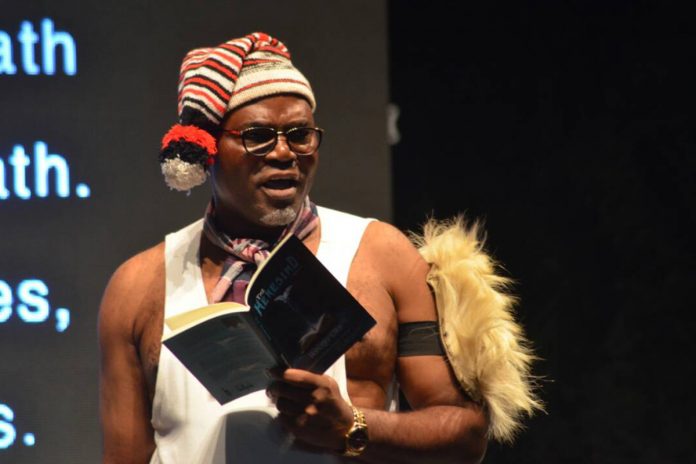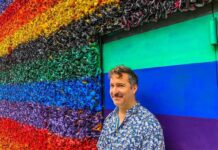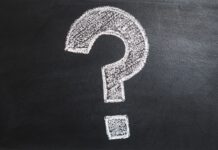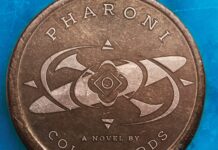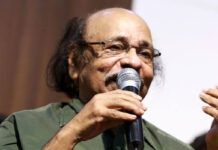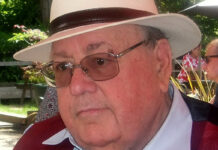Ikeogu Oke is the winner of the 2017 edition of the Nigeria Prize for Literature, an annual competition sponsored by Nigeria LNG Ltd (NLNG). Mr. Oke’s collection of poems, The Heresiad, came tops from among 184 entries received for the competition. He was also awarded with a cash prize of $100,000. A former standards editor and deputy editor (arts and culture) at the now rested NEXT newspaper, Mr. Oke speaks about his passion for poetry and literature appreciation in this interview with Premium Times (PT).
( Interviewer: Jayne Augoye )
PT: Congratulations on winning the NLNG-sponsored The Nigeria Prize for Literature. Were you really expecting it?
Ikeogu: Yes. The judges’ decision vindicated my expectation. But I was also anxious in an essentially human way and expressed this in a short poem I shared on my Facebook page on the day of the decision. It was entitled “Anxious.” Even the last line hinted that I was optimistic of savouring a sweet victory in spite of my anxiety. I believed I had a very strong entry. I also believed the entry rule that the competition would be judged on the basis of merit. With both in mind, I was not surprised I won. Nonetheless, I feel grateful and humbled that the judges chose mine as the winning entry.
PT: How did you cope with the pressures of being on the NLNG shortlist in the months leading to the award ceremony?
Ikeogu: My mood generally switched from hope to anxiety while I immersed myself in my literary and journalistic work to help me cope with the anxiety. But I was willing to defer to the decision of the judges if it did not favour me. With my mind conditioned to do this, anxiety became easier to cope with. Of course, the hope, though it flagged occasionally, was naturally bound to stay alive, as it were, until the judges’ decision was announced, which turned out favourable and to have met my expectation for reasons I have already stated.
PT: Tell us a bit more about your award-winning book, The Heresiad?
Ikeogu: The Heresiad is an epic, an adaptation of heroic couplets, which I call lyrical pentameters. I also call it operatic poetry, since it is also a musical and dramatic work like a typical opera and I anticipate its adoption or adaptation for the operatic stage for that reason. It is also a long art song, perhaps the longest of such in existence. Each of its lines can be sung and set to music as some are in the current publication. It is divided into four cantos, for which, being also a musical work, I may also describe it as a literary symphony in four movements. In the poem, an author is accused of heresy and is then condemned to death by a powerful religious leader who makes the accusation with others. Reason intervenes in a conciliatory way to save an author. This makes ”Reason” the hero of the story. And so the poem is subtitled “Song of Reason.” “Heresiad” is my coinage.
PT: It isn’t a recent work , right?
Ikeogu: I started writing the poem in 1989. In four years, I had a solid manuscript on which I worked intermittently down the years. In 2016, a friend who had read what I then thought was the definitive manuscript asked me to enter it for the NLNG Prize, describing it as “a magnum opus.” I hesitated, but later agreed. After sending it to the publisher, I wrote six extra lines. I then called the publisher with a request to insert the new lines into the poem. He protested, understandably, explaining that he was almost through with the typesetting. But then, he relented after further persuasion and I updated the manuscript with the new lines and resubmitted it to him. This was in 2016. So it was 27 years from 1989 when I started the composition to 2016 when I wrote the last lines that I put in the poem.
PT: Critics say poetry has had a difficult run in the NLNG-sponsored The Nigeria Prize for Literature and in the world at large. Do you agree?
Ikeogu: I don’t agree, if by that the critics, in the case of the NLNG-sponsored The Nigeria Prize for Literature, mean the fact of the poetry award having not been given in certain years. That has also happened in the children’s literature category, showing that the prize category is not singled out for such reservation by the judges. This is a prize, whose rules usually state that the judges have the discretion not to award the prize if they think no entry merits it. If the judges have thought so in certain years for poetry, I wouldn’t think it is a case of poetry having had a difficult run with the prize. I would rather think those were specific cases of the entries having not satisfied the judges enough to justify their awarding the prize to any of them. But then, it is undeniable that poetry, which used to be the most popular of the literary genres, now has a difficult run with people generally. I even have a line in The Heresiad which speaks of giving “a lifebuoy to a drowning art,” the ”drowning art” being poetry. The line reflects my appreciation of this problem and many others for which poetry may be considered an endangered art form in desperate need of help. But I think poets are partly to blame for the current woes of poetry and what seems to be a badge of notoriety worn by poetry. Some of them will tell you that they write only for poets, seemingly taking strange pleasure in limiting themselves and the reach of their art. I think such remarks, whatever good they’re meant to serve, are a huge disservice, and very bad PR, for poetry. If you tell non-poets that they don’t count in your reckoning as a poet, that you’re indifferent as to whether or not they read your work, you don’t expect them to come running after your poetry in a world in which respect is said to be reciprocal.
PT: What do you think can be done to make poetry and poets more appreciated in our clime?
Ikeogu: I think the current relative unpopularity of poetry compared to other literary genres can be reversed if poets make a conscious effort to democratise their work in terms of relevance and accessibility without compromising the artistic value of such work or the quality of their craft. One of the disappointing remarks I have read recently was from a Nigerian poet who said, “no poem or book of poetry is worth $100,000.” And that’s in a world in which some footballers earn over a $100,000 a week, some with far less education than the poet in question. Now, if poets have such low opinion of the material value of their work, why would others place a high value on their work or take them seriously for that matter. This sort of poverty mentality, internalised and propagated by some Nigerian poets, is partly why poetry is having a difficult time in our country. So, our poets have some blame for the problems facing contemporary Nigerian poetry.
PT: As a poet, who has remained in active practice for about three decades, what has kept you going?
Ikeogu: I have been sustained by loving what I do for its own sake and believing that “What you do, you must do on your own/The main thing is to write/for the joy of it”, as the Irish poet Seamus Heaney affirms in “Station Island.”
PT: In a recent interview, you were quoted as saying that “poetry is not an art for people in search of quick material success.” Can you shed more light on what you meant?
Ikeogu : Around 1990, one of my supportive and sympathetic correspondents, an American and an editor in a publishing house, wrote me a letter. In the letter he said, among other things, that poetry was not an occupation but an enriching avocation. But it can be both, for there are poets like Pablo Neruda who celebrated poetry as their occupation and made a success of taking it as such. But the letter simply put me on my guard against having an unrealistic expectation that writing poetry would make me rich in the short or long term except in “spiritual” terms by, for instance, opening doors of opportunities and to the hearts of people the way money may not be able to. With that implied admonition, given after I had told the editor of my decision to embark on a career as a poet, I was determined to run my career as a poet like a marathon whose only reward would be to realise at the finishing line that I ran a good race. I had begun writing The Heresiad then, and I took it with me on the marathon for 27 years. As far back as 1988, an American magazine paid me for my first published poem and others it subsequently published. So, I’m not saying this as someone who has never earned money for his poems. But for me poetry is a sacrificial art form. And if you approach it like a gold rush you risk being disillusioned in no time and will have to part ways with it like some of my friends with whom I set out writing poetry who have congratulated me for winning the NLNG Prize many years later.
PT: Your poetry is noted for its angry and sometimes introspective reflection on political and social issues. Do you think Nigerian poets have been outspoken/fared well (through their works) in this regard?
Ikeogu : I don’t consider anger a defining feature of my poetry, though anger, which I try to expresses beautifully, can be deduced from some of my poems. Yes. My poetry can be what you can an “introspective reflection on political and social issues.” No. I don’t think Nigerian poets, except for a few exceptions, have fared well in this regard. Nigerian poetry still largely subsists at a rudimentary stage of passionate, angry and disenchanted expressiveness. It needs to be sobered with deep thought, thoroughly beautified, and imbued with philosophical grandeur. But in writing poetry that inveighs against socio-political malaise, Nigerian poets probably have no rivals, except that the poetry is quite often lost in the whirlpool of their rage and that their work ends up appearing more angry than poetic.
PT: Nobel laureate, the late Nadine Gordimer, has praised your poetry. How did that make you feel?
Ikeogu : I felt honoured and flattered by Nadine Gordimer’s interest in my work. And doubly honoured when she told me over a private conversation unrelated to my work that she didn’t say things she didn’t believe in. So I knew that she meant the positive things she said about my poetry, and later my novel manuscript a part of which she had asked me to send her to read.
PT: Do you have any career highpoints you will love to share with us?
Ikeogu : One is the publication of “Circulation Good”, my first published poem, on the back cover of Unity Magazine for September 1988 for which I was paid $19 following its acceptance by the magazine the previous year. It was like witnessing the birth of one’s first literary offspring. The pure ecstasy of it remains unforgettable. The magazine is the flagship publication of Unity School of Christianity, Kansas City, Missouri. I had written the poem for the pure pleasure of it as a teenager the previous year, and with no formal literary education. That experience taught me that I could earn money from writing poetry even without meaning to. The next was the request by a certain American author, a Buddhist, to reprint “Circulating Good” in his book, published in 1989, which he conveyed to the editor of Unity Magazine who later sent it to me and I approved it. That experience taught me that my poetry, and poetry generally, can be so useful to people that they may request its use for their own ends as one of its “spiritual” benefits of adding value to peoples’ lives. The second was John Milton Society for the Blind, New York, requesting to reprint my poem “From Now” originally published in Unity Magazine in DISCOVERY, their magazine published in Braille. That experience taught me that even from an undistinguished location I, and anyone else, could create something institutions located in far-off places and great nations could consider valuable to them and request to use it. The fourth and by far the most significant is winning the NLNG Prize. The experience has taught me that creativity and hard work can be rewarding beyond one’s choice to make them their own reward.
PT: What is the first thing that comes to your mind when you sit down to write a poem and what emotions do you like to evoke in your poems?
Ikeogu : The process by which I write poems is complex. It usually begins in the mind, and is both psychic and psychological, as in conditioning one’s mind to tune in to some extra-terrestrial poetic frequency, which results in most of my poems being completed in my mind before I begin writing them physically. So, I typically don’t “sit down to write a poem” as if writing a poem is the product of a strong resolution, some willful muscling through an obstacle, and then choose the emotions to evoke. My poems are usually products of spontaneity, with the thoughts and emotions ingrained in them, coming and burgeoning naturally “as the leaves to a tree”, as John Keats puts it in that famous letter to John Taylor. Over the years, I have learnt to actuate the need to write a poem and then anticipate the inspirational moment and seize it once it arrives. Sometimes, the poetic moment comes without my prompting or anticipation like an irresistible gift.
PT: Who is your favourite Nigerian poet?
Ikeogu : Niyi Osundare. His poetry is accessible, unpretentious, sage, and an engaging vehicle for the three main tendencies of commitment: social, cultural and political.
PT: You also write poetry for children. What inspired this?
Ikeogu : I realised that children would have to play a key role as consumers and propagators of poetry if the future of poetry must be saved, which also applies to other literary genres. And one way of inducting them for this role is by catching them young for poetry, as it were, by writing the types of children’s poems they will find irresistible for their beauty, and for their entertainment and educational value, as well as their edificatory quality. If children are happy with the literary legacy we expose them to, they will be more likely to pass it on to the next generation as adults.
PT: Having performed some of your poems at home and abroad, what’s your take on performance poetry and spoken word in Nigeria?
Ikeogu : Performance poetry, which by the way is different from poetry performance, and spoken word has been useful in popularising the idea of poetry they represent in Nigeria. But on the occasions I witnessed performance poetry and spoken word events in the country, I saw the performance and heard the spoken word but wondered where the poetry was.
PT: Poetry is quite popular amongst poets, not so much with others. How do you think poetry appreciation can be revived in Nigeria?
Ikeogu : It is not in the interest of poets or society for the popularity of poetry to be restricted to poets. The wider its popularity, the greater its potential for proving beneficial to poets and society at large. Poetry appreciation can be revived in Nigeria by making poetry a source of pleasure for poets and non-poets alike. It is human nature for people to seek continuous engagement with things that give them pleasure, including perverse pleasure. And poetry cannot be different.
PT: What are the challenges confronting poets and writers in Nigeria?
Ikeogu : Many poets and writers in Nigeria do not seem to me to have done the necessary honest self-appraisal to determine whether they should not be doing something else. This results in what one may call gaps of vocational competence, which undermines the prestige of the literary vocation especially among those outside the vocation. And for the competent ones, there is hardly any systemic support to encourage their work in the form of grants and whatnot from government and other agencies as you have it in many other countries. I have been mulling some literature-related projects and others. But I would rather receive the prize money before finally deciding on what to do with it.
PT: You are better known as a poet and a writer. Not many are aware that you are also a journalist. Do you intend to go back to the newsroom?
Ikeogu : I will not rule out the possibility of going back to the newsroom. Working in the newsroom was one of the most gratifying and rewarding experiences of my life. And I continue to benefit from that experience and some of the wonderful people who were part of it.
PT: It would seem that publishing in this country has declined. What do you think is wrong?
Ikeogu : Many things are wrong. One is the apparent entrenchment of what Charles Nnolim once referred to as “the shenanigans of Nigerian publishers”, which undermines the morale of writers and their output and invariably the business of the publishers. It is common sense that there cannot be a thriving publishing industry without happy writers. To have such will be a mark of an anomalous and sick society. But the average Nigerian publisher seems too short sighted to recognise this and so would rather short-change writers than work for their mutual prosperity. There is also the problem of the perennial weakening of what I would call the editorial infrastructure across our publishing industry, leading often to the publication of poorly edited books sometimes fraught with grammatical errors and other inelegancies. There is also the problem of a weak structure for book distribution across the various physical and virtual platforms by which books are currently sold and distributed globally. Nigerian publishers will have to improve their ethics and invest in staff with first-rate capabilities as well as new technologies and logistical expansion to possibly overcome these and many other challenges facing Nigerian publishing.
_______________________________________________________
Acknowledgement:
Republished with permission from Premium Times, Nigeria (www.premiumtimesng.com) and the poet, Ikeogu Oke and the interviewer, Jayne Augoye.


